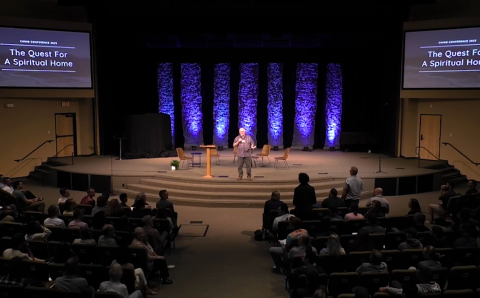In 2010, my wife, Arlene, and I bought our current home in Muskegon, Mich., for $20,000. While this home was not in the part of town with the highest housing prices, and while the housing market was still recovering from the recession, this was still a small amount to pay for a home.
There was a reason our house was so inexpensive, and when we toured the house with our good friends shortly after signing the papers, we could see by the looks on their faces that they were seriously questioning our judgment.
In making our decision to buy the house, Arlene and I needed to look beyond the plaster that had fallen off the ceiling. We needed to understand that the plumbing could be replaced and the broken glass in the windows—and sometimes the whole window—could be repaired. We were pretty sure that new plumbing would eliminate the foul odor coming from the basement (it did!) and that removing the carpet and refinishing the floors would be a simple solution to the flooring issues. We needed to believe that this old house could be restored and be a suitable home for us and our five children (plus an exchange student).
In his book Not the Way It’s Supposed to Be, Cornelius Plantinga writes, “In the Bible, shalom means universal flourishing, wholeness, and delight—a rich state of affairs in which natural needs are satisfied and natural gifts fruitfully employed, a state of affairs that inspires joyful wonder as its Creator and Savior opens doors and welcomes the creatures in whom he delights. Shalom, in other words, is the way things ought to be” (emphasis his).
This simple concept of shalom as “the way things ought to be” has given me a lot of personal satisfaction in the work we have done on our home. Each step of the way, we have sensed that we are, in a way, undoing the effects of the fall and shaping our home to become more of what God would declare it “ought to be.” We also enjoy and benefit from using the home for its intended purpose—namely, providing a place for our family to find shelter and to share our love and support of each other. We feel gratitude for the opportunity to continue the work of shalom that God first began in us.
This idea of describing shalom as the way things ought to be illustrates the transforming power of the gospel of Jesus Christ for each of us personally. When God looks at us, he doesn’t see us in our fallen state, with cracking plaster and stinky basements. As the love of Jesus fills us, the process of restoration begins, and it is ongoing. As we display the fruit of the Spirit’s work in our lives, we more closely resemble the way we ought to be according to God’s design. And as we nurture, develop, and care for this world and the people in it, we take joy in fulfilling the purposes for which he created us.
In my short time working for the Christian Reformed Church (I started July 3), I’ve been inspired by learning about all the ways God is using this little denomination. From the physical support the disaster response teams of World Renew provide to thousands in the name of Jesus, to the sharing of the gospel in dozens of countries and languages through the efforts of Reframe and Resonate, to the work of Thrive as it strengthens congregations and bolsters their witness, we can be eternally grateful for God’s sustaining hand as we are used to make this world more as our God has declared it ought to be—and will be one day soon.
About the Author
Dan DeKam is director of U.S. ministry operations for the CRCNA. He is a member of Bethany CRC in Muskegon, Mich.








